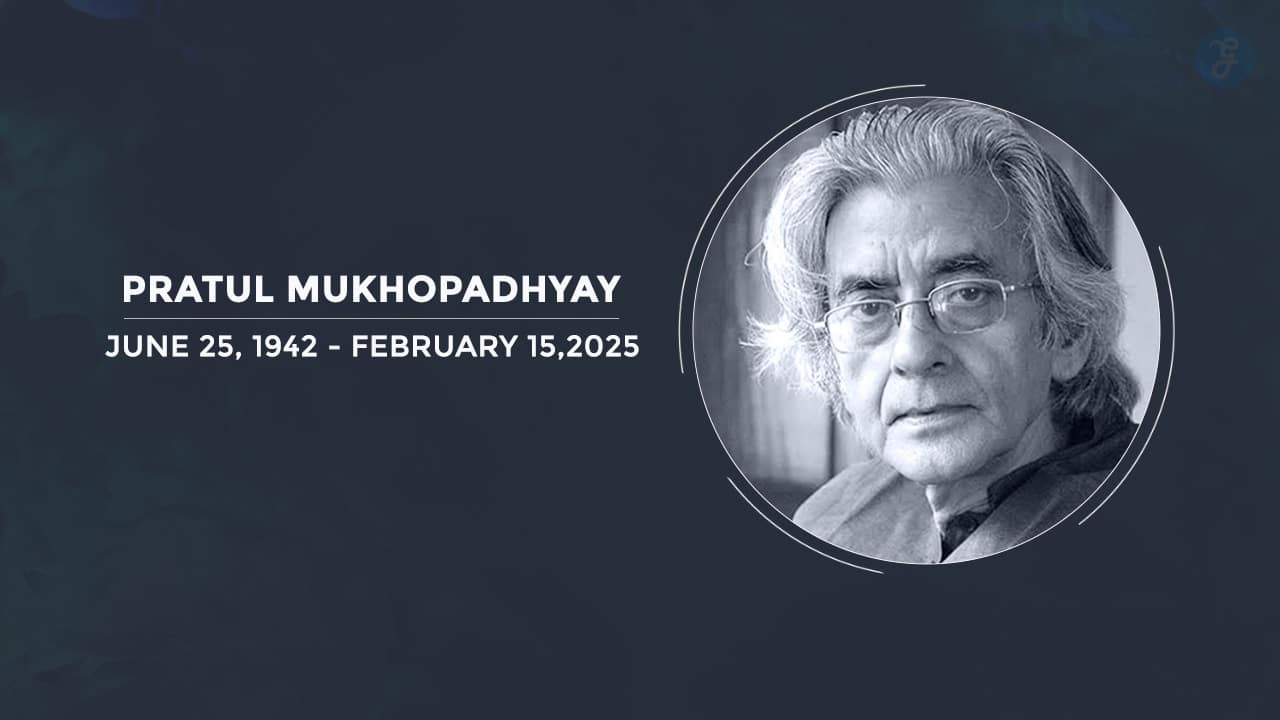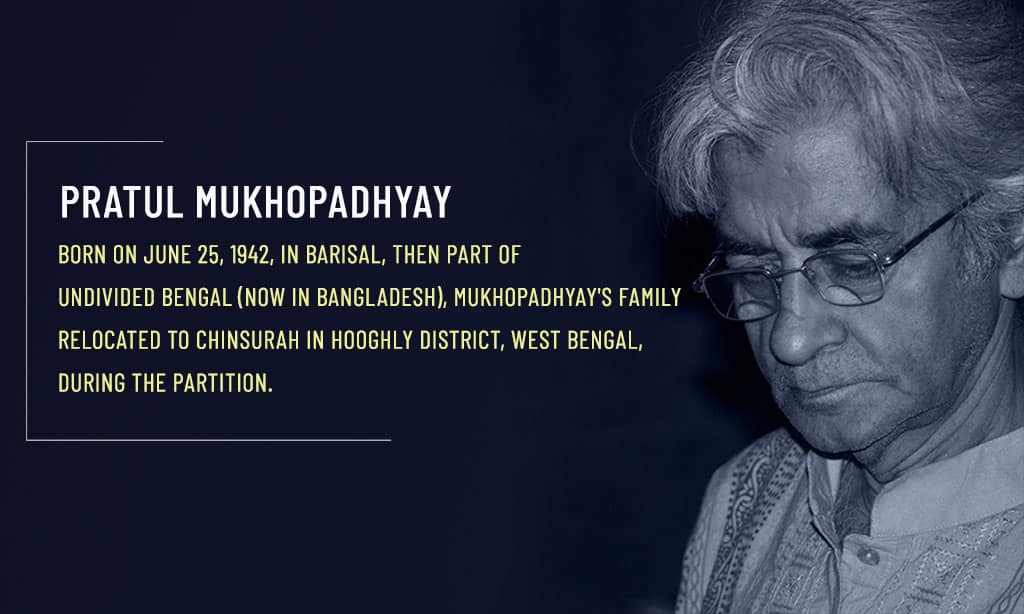Veteran Bengali singer-songwriter Pratul Mukhopadhyay passed away on Saturday, February 15, 2025, at the age of 83, after a prolonged illness. A senior official from the West Bengal health department confirmed his demise. Mukhopadhyay was celebrated for his profound contributions to Bengali music, particularly his songs that addressed social issues, often performed without instrumental accompaniment.
Early Life and Musical Journey
Born on June 25, 1942, in Barisal, then part of undivided Bengal (now in Bangladesh), Mukhopadhyay’s family relocated to Chinsurah in Hooghly district, West Bengal, India, during the Partition. His father was a schoolteacher. From a young age, Mukhopadhyay exhibited a natural talent for music. At just 12, he composed a tune for a poem by the eminent poet Mangalacharan Chattopadhyay. This early endeavor marked the beginning of a lifelong dedication to songwriting, composing, and singing. In the late 1960s, he began his career as a songwriter, composer, and singer, often experimenting with traditional Bengali music forms while addressing contemporary social issues.
His unique approach and deep connection to Bengali culture resonated with many, leading to a dedicated following. After the release of Pratul’s first album ‘Jete Hobe’ (1994), the audience was faced with a completely different kind of music. Pratul had abandoned instrumental accompaniment on stage, but not in this album. The instruments remained like a distant horizon behind his songs. The songs were the main thing there. Pratul’s own voice sounded in the interlude. It was a unique experience! Above all, his voice, intonation and pronunciation. In the world of modern Bengali, which was saturated with honey, he was like an embodied vandal. In the world of Bengali songs, which was proud of its ‘sukantha’, Pratul, with his strong ‘mannerism’, said in the pronunciation of the poet Subrata Sarkar of the seventies, ‘Sahya karo, Bangla Bhasha’.
Video Credit: @rohanguptakolkata
Pratul has sung for the little ones. Almost every song in the album called ‘Kuttus Kattus’ has a kind of affectionate and soothing touch. Suman-Nachiketa-Anjan’s ‘Chhot Baro Mile’ and is this album by Pratul the last ‘Chhotder Gaan’ of Bengal? Salil Chowdhury’s work started with Antara Chowdhury enhancing the songs so the little ones could become ‘big’. Pratul has carried the legacy of that work in his album.
Pratul has said in several interviews that he did not have a traditional education in music. In his words, “I learned by listening, by doing.” His listeners also had to stumble at first while listening to his songs. How a person becomes a ‘complete song’ by putting aside everything – voice, training, refinement – is something the next generation will have to practice thinking in the gymnasium of thought. How was it possible that the generation growing up in the 1990s no longer remembers? Pratul was one of the few people who overturned the stagnant politics and the ‘feel good’ feeling of ‘peace and prosperity for the time being’.
Iconic Contributions to Bengali Music
Video Credit: @songforall
Pratul Mukhopadhyay’s oeuvre is a tapestry of cultural pride and social critique. His magnum opus, “Ami Banglay Gan Gai” (I Sing in Bengali), became an anthem for Bengali identity, transcending borders to unite audiences in West Bengal and Bangladesh6. The song was ranked among the BBC Bangla’s Top 20 Greatest Bangla Songs in 2006 and has been covered by artists like Anupam Roy and Mahmuduzzaman Babu611. Other classics include:
- “Dinga Bhashao Sagore” (Sail the Boat in the Sea)
- “Alu Becho” (Sell Potatoes) – a satirical take on economic struggles
- “February Ekush Tarikh” (21st February) – honoring Language Movement Day6
His distinctive style of performing without instrumental accompaniment amplified the rawness of his messages39. Beyond music, he authored books like “Shakti-Rajniti” (Power Politics) and “Pratul Mukhopadhyayer Nirbachito Gaan” (Selected Songs), cementing his legacy as a multifaceted intellectual1. He also contributed as a playback singer for films like “Gosaibaganer Bhoot”
Health Struggles and Demise
In the first week of January, the singer was admitted to SSKM Hospital due to health issues. According to hospital sources, he was experiencing nasal bleeding. Following this, neurology and ENT specialists examined him.
In early February 2025, Mukhopadhyay was admitted to the state-run SSKM Hospital in Kolkata due to pancreatic ailments and other age-related health issues. Despite undergoing surgery on February 6, his condition deteriorated. He was moved to the Intensive Therapy Unit (ITU) following complications and did not respond to dialysis performed on Friday. He suffered a cardiac arrest on Saturday morning, leading to his passing. His death coincided with the anniversaries of two other legendary Bengali musicians, Sandhya Mukhopadhyay and Bappi Lahiri, marking a poignant moment in the region’s cultural history.
Tributes and Legacy
West Bengal (India) Chief Minister Mamata Banerjee, who visited him days before his death, hailed him as a “torchbearer of Bengali culture” and orchestrated a state honor farewell at Rabindra Sadan, where thousands paid homage25. His body was donated to SSKM Hospital per his wishes, reflecting his commitment to societal welfare beyond art210. Pratul Mukhopadhyay’s mortal remains were made available for public homage at Kolkata’s Rabindra Sadan from 2 pm to 4 pm on the day of his passing. His death coincides with the anniversaries of two other legendary Bengali musicians, Sandhya Mukhopadhyay and Bappi Lahiri, marking a poignant moment in the region’s cultural history. Pratul Mukhopadhyay’s legacy in Bengali music is immeasurable. His songs, rich with cultural pride and social commentary, will continue to inspire and resonate with future generations.
Cultural Impact:
- Political Voice: Associated with the Indian People’s Theatre Association (IPTA), his songs fueled anti-establishment movements, though his later appearances at Trinamool Congress events drew mixed reactions5.
- Global Recognition: “Ami Banglay Gan Gai” was featured in the film “Kranti” and inspired cross-border collaborations, notably with Bangladeshi artist Mahmuduzzaman Babu6.
- Quotes: Lyricist Latiful Islam Shibli remarked, “One song is enough to immortalize an artist… Pratul Mukhopadhyay will live forever in the hearts of Bengali-speaking people”6.
Mukhopadhyay’s legacy endures as a bridge between tradition and modernity, his voice echoing in protests, festivals, and everyday lives. As long as Bangla music thrives, his anthems will remain timeless.
Lopamudra Mitra and Anupam’s Reminiscences of Pratul Mukhopadhyay
Lopamudra has known Pratul Mukhopadhyay since 1993. Recalling her memories, the singer says, “Pratulda was much older than us. I had known him for a long time. But from the very first day, he was ‘Pratulda’ to me. He had a group of friends, and I used to call all of them ‘Kaka’ (uncle). But I always called him ‘Dada’ (elder brother). I first met him at the 1993 Book Fair. There used to be informal singing sessions there. Later, we performed on the same stage at an event at Rabindra Sadan. Suman, Nachiketa, and Anjan were also part of that program. Pratulda used to compose songs by setting tunes to poetry. He was a great inspiration to me.”
Lopamudra also admits to feeling envious of Pratulda for one reason. She says, “Music was his passion. He would sing in his own way, without caring about promotion. He always avoided publicity. That made me envious.” The late artist also liked Lopamudra’s songs, except for one. She confesses, “Pratulda loved listening to my songs, but he never liked Benimadhab. However, after the song was recorded, it became quite popular. So, he used to say, ‘There’s nothing more to say now. Benimadhab is a super hit.’ I had a very sweet relationship with Pratulda.
Reacting to the news of the artist’s passing, Anupam said, “I was a big fan of Pratulda. He was a truly talented and unique artist. His way of singing and thinking about music was different from others. Losing him is a great loss for us. He had many great albums, not just one song. I even listened to his performances sitting in the front row. He was an important artist for Bengal. One of my favorite songs is Lal Komola Holde Sobuj. It was originally a poem by Mao Zedong, which he translated and set to music. He used to tell stories while singing. That memory is still vivid in my mind.”
Anupam believes there will never be another artist like Pratul. He adds, “His era and his way of thinking are absent in today’s artists. Maybe new kinds of music will emerge now, but even in his time, he was exceptional.”




































